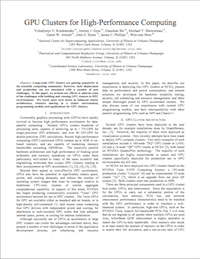
Large-scale GPU clusters are gaining popularity in the scientific computing community. However, their deployment and production use are associated with a number of new challenges. In this paper, we present our efforts to address some of the challenges with building and running GPU clusters in HPC environments. We touch upon such issues as balanced cluster architecture, resource sharing in a cluster environment, programming models, and applications for GPU clusters.
Commodity graphics processing units (GPUs) have rapidly evolved to become high performance accelerators for data- parallel computing. Modern GPUs contain hundreds of processing units, capable of achieving up to 1 TFLOPS for single-precision (SP) arithmetic, and over 80 GFLOPS for double-precision (DP) calculations. Recent high-performance computing (HPC)-optimized GPUs contain up to 4GB of on- board memory, and are capable of sustaining memory bandwidths exceeding 100GB/sec. The massively parallel hardware architecture and high performance of floating point arithmetic and memory operations on GPUs make them particularly well-suited to many of the same scientific and engineering workloads that occupy HPC clusters, leading to their incorporation as HPC accelerators. Beyond their appeal as cost-effective HPC accelerators, GPUs also have the potential to significantly reduce space, power, and cooling demands, and reduce the number of operating system images that must be managed relative to traditional CPU-only clusters of similar aggregate computational capability. In support of this trend, NVIDIA has begun producing commercially available “Tesla” GPU accelerators tailored for use in HPC clusters. The Tesla GPUs for HPC are available either as standard add-on boards, or in high-density self-contained 1U rack mount cases containing four GPU devices with independent power and cooling, for attachment to rack-mounted HPC nodes that lack adequate internal space, power, or cooling for internal installation.
All information that you supply is protected by our privacy policy. By submitting your information you agree to our Terms of Use.
* All fields required.


